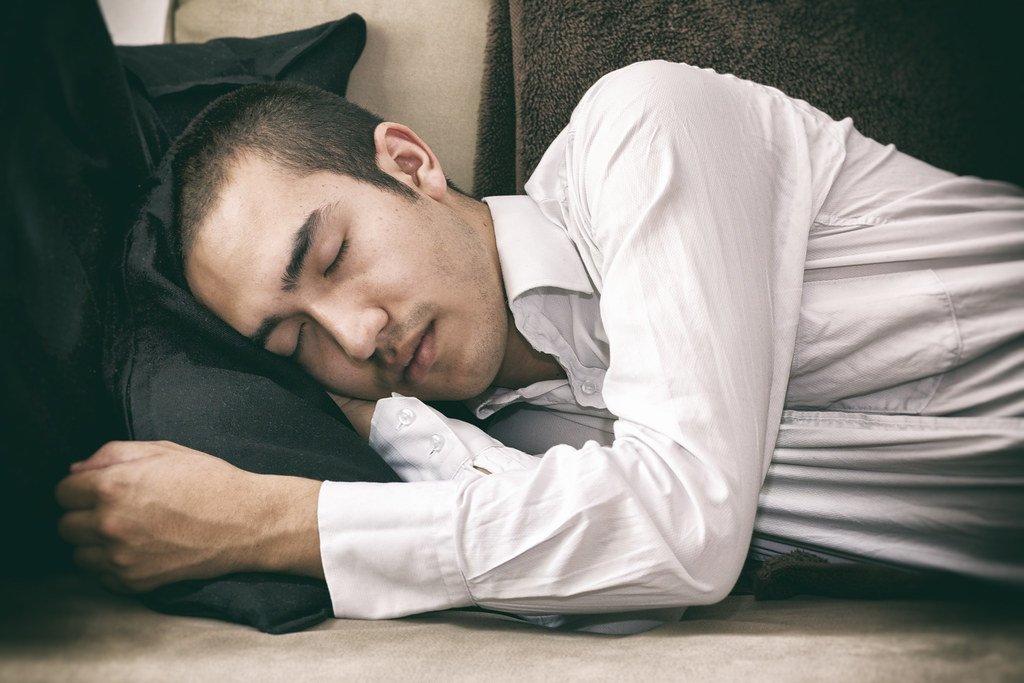Sleep paralysis

The inability to move when transitioning from sleep to wakefulness is called sleep paralysis. The affected person is awake but unable to move as the muscles remain paralyzed. When sleep paralysis occurs as part of four cardinal symptoms, it may suggest narcolepsy. However, it also occurs commonly in healthy people, especially in periods of stress.
Excessive daytime sleepiness
The complaint of excessive daytime sleepiness may be common to numerous sleep disorders or in those who simply do not sleep enough. It consists of a subjective, inappropriately increased desire to fall asleep and lack of energy during the day even after an adequate night of sleep. It may manifest by falling asleep at improper times, such as in meetings, while reading or watching television, while talking to someone, or while driving.
It may be subjectively measured with tests such as the Epworth sleepiness scale, or objectively with the maintenance of wakefulness test (MWT), or multiple sleep latency testing (MSLT).
Breathing problems
Snoring occurs commonly, but severe snoring as well as pauses in breathing may suggest a serious condition like sleep apnea. Sleep apnea consists of repeated episodes in which breathing stops, the oxygen levels of the blood fall, heart rate increases, and the affected person briefly awakens. The causes of sleep apnea are diverse with the potential fordangerous consequences. Other conditions such as sleep groaning, upper airway resistance syndrome (UARS), and central sleep apnea may also affect nighttime breathing.
Leg movements
Uncontrolled leg movements while sleeping may occur in several overlapping disorders, including restless legs syndrome (RLS) and periodic limb movement syndrome (PLMS). They may also occur distinctly as nocturnal seizures or even as the common experience of night starts. The causes of RLS can vary extensively, perhaps occurring due to iron deficiency, other disorders, or pregnancy. Fortunately there are effective treatments if your legs move around at night.
Weight gain
It may be hard to believe, but difficulty losing weight or even gaining it may have an unlikely cause: poor sleep. Sleep deprivation has been linked to hormonal changes that predispose to weight gain. Circadian rhythm sleep disorders such as seasonal affective disorder (SAD) can lead to carbohydrate craving and weight gain. Any sleep disorder that leads to excessive daytime sleepiness may lead to high calorie intake that may pack on the pounds.
Hyperactivity
Children do not have the same symptoms as adults when they experience sleep disorders. Rather than experiencing excessive sleepiness like adults do, they have the opposite response: they become hyperactive. This increased activity, difficulty with concentration, and inattentiveness may be mistaken for attention deficit hyperactivity disorder (ADHD) in children with sleep problems.
Mood problems
If you are not sleeping well — no matter the reason — you are unlikely to be in the best of moods. However, some conditions such as seasonal affective disorder are strongly associated with mood problems. Sleep apnea may leave you with poor concentration, personality changes, and memory problems. Depression itself may have symptoms that overlap with sleep problems and treating both may be necessary.
Inability to sleep
If you have difficulty falling or staying asleep, you may discover that the symptom of your sleep disorder is a simple inability to sleep. These symptoms are collectively termedinsomnia. This may include a range of conditions, from acute insomnia to fatal familial insomnia. Diagnostic tests are available and there is significant help for insomniacs.
Uncontrolled behaviors
Sometimes movements during sleep go beyond a little leg kick. When the behaviors become complex and uncontrolled, they may be due to one of the parasomnias. These abnormal actions or events that occur around sleep can range from sleep eating, sleepwalking, and even the enactment of dreams. The parasomnias can be terrifying and even dangerous, coming out of the various stages of sleep. If you can do it awake, it may even occur while asleep in the right circumstances.
Morning headaches
A headache in the morning may sound rather harmless. However, if it occurs on a regular basis in the context of disrupted nighttime breathing, morning headaches may suggestsleep apnea. Sleep apnea can occur with a constellation of unexpected symptoms: poor memory, uncontrolled high blood pressure, stroke, and sudden death. These are reasons enough to take even minor symptoms seriously.
Retrieve From: http://sleepdisorders.about.com/

The subsequent time I learn a weblog, I hope that it doesnt disappoint me as much as this one. I imply, I do know it was my choice to read, but I really thought youd have one thing interesting to say. All I hear is a bunch of whining about one thing that you may fix in case you werent too busy in search of attention.
I was just looking for this information for a while. After six hours of continuous Googleing, at last I got it in your site. I wonder what’s the lack of Google strategy that do not rank this kind of informative web sites in top of the list. Usually the top sites are full of garbage.